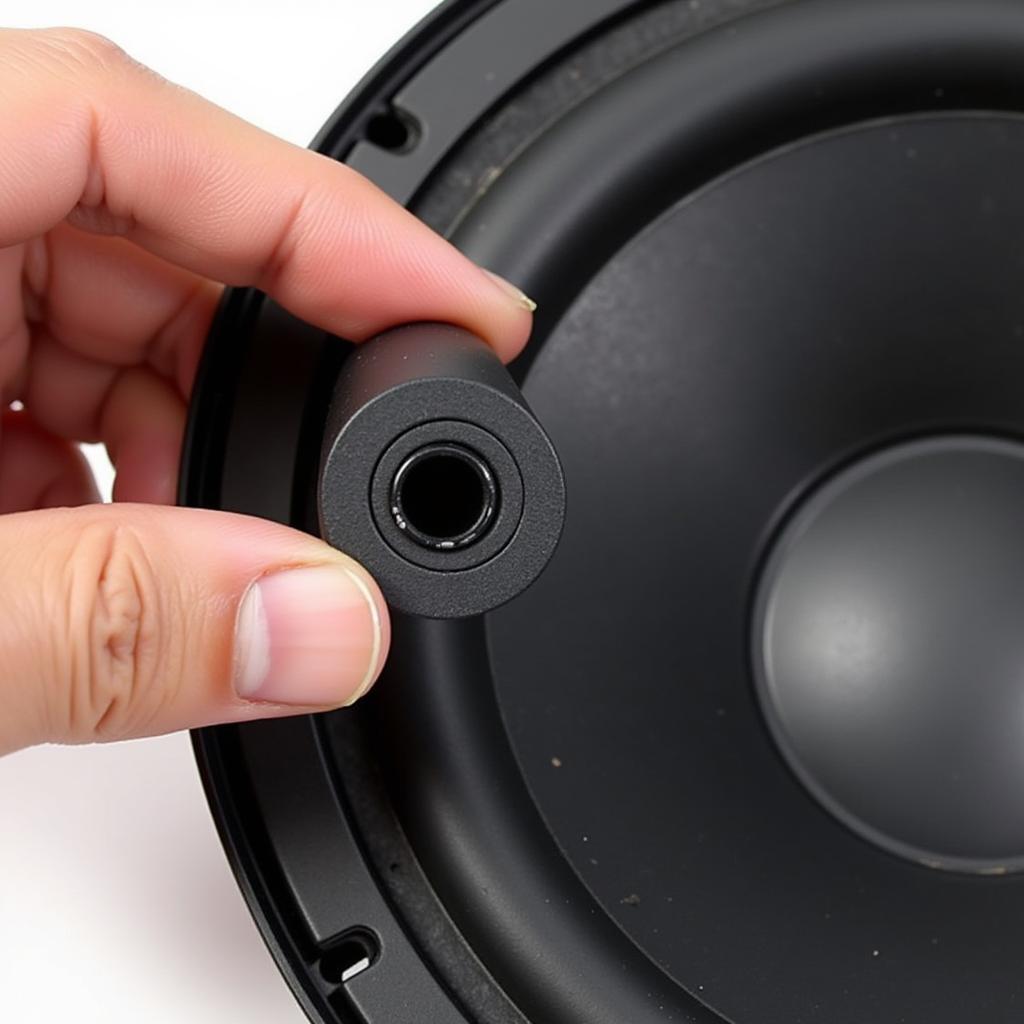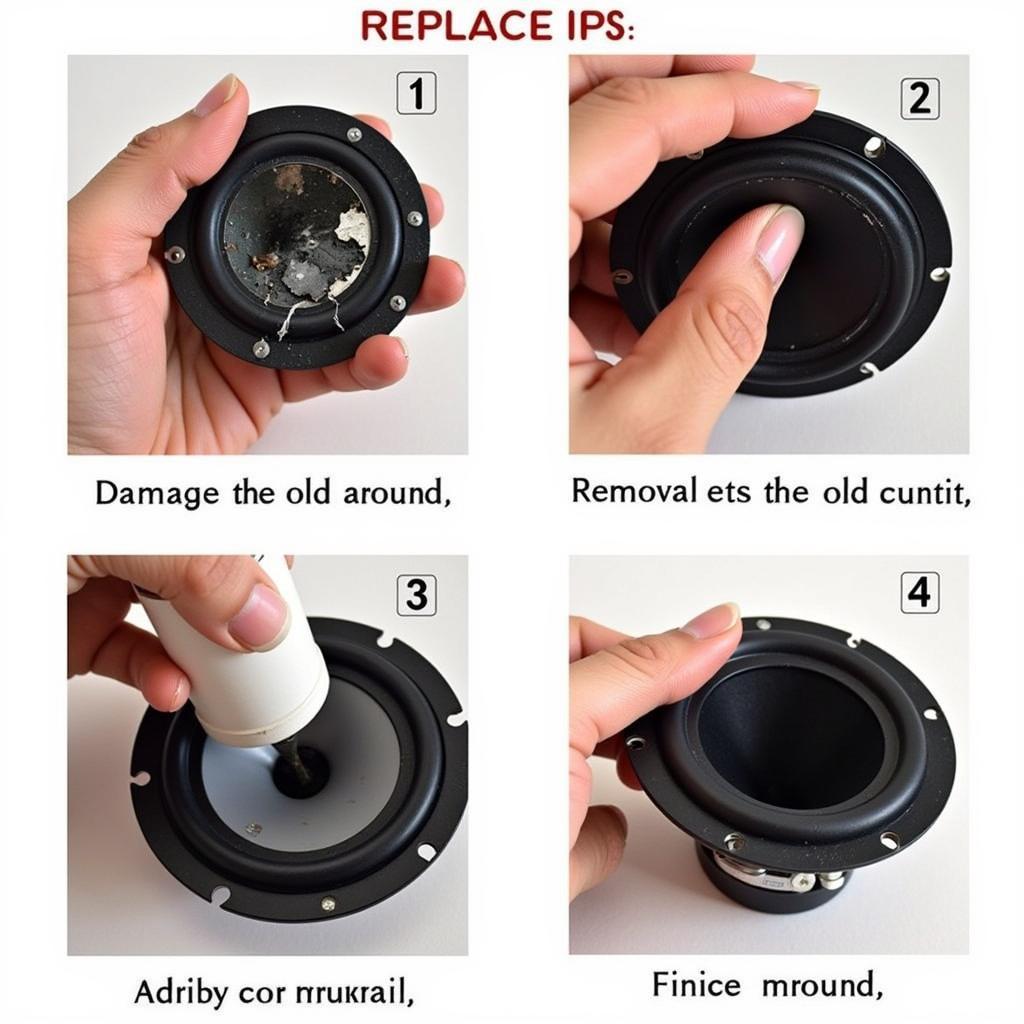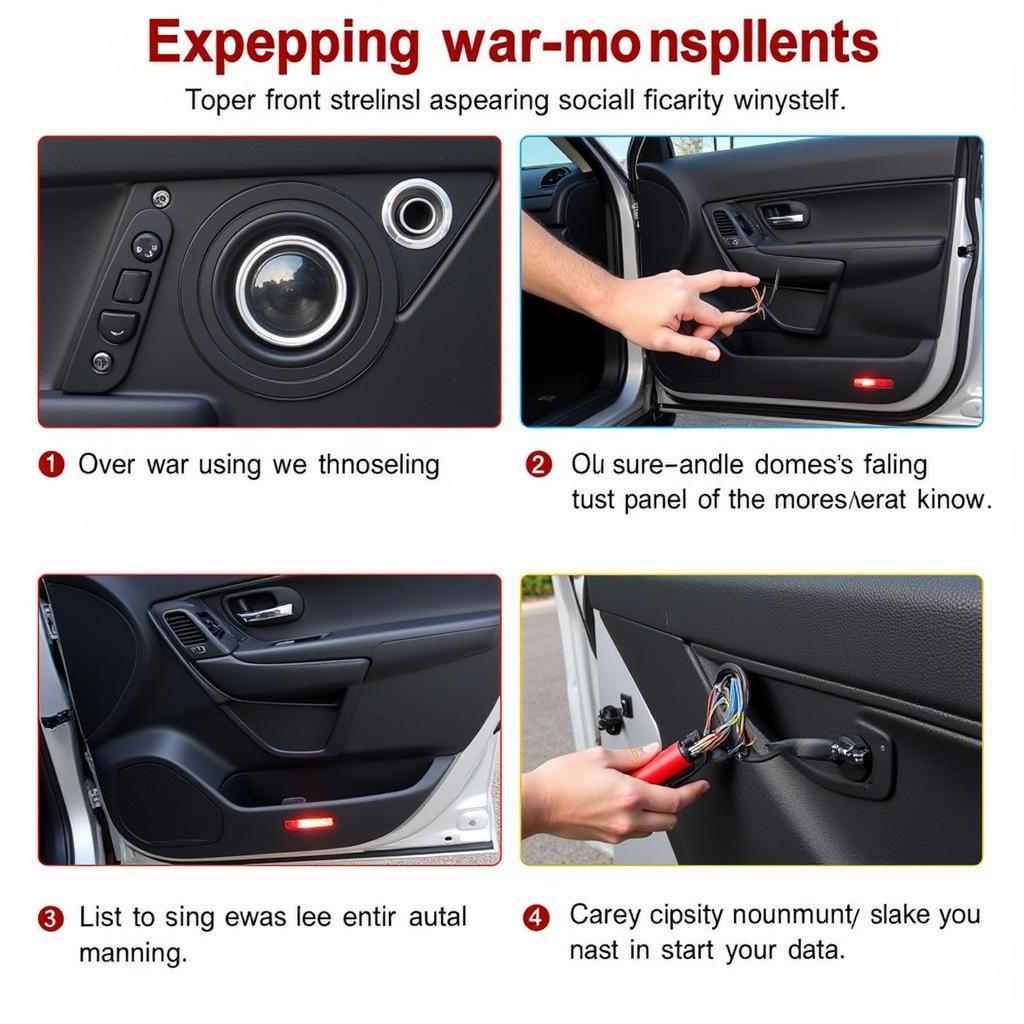Experiencing a distorted, rattling, or buzzing bass in your car speakers can ruin your listening experience. This article will guide you through the process of diagnosing and fixing that annoying car speaker bass disturbance so you can get back to enjoying your favorite tunes.
Understanding Car Speaker Bass Disturbance
Bass disturbance in car speakers manifests as a rattling, buzzing, or distorted low-frequency sound. It can stem from a variety of issues, ranging from loose components to damaged speaker cones. Accurately identifying the source of the problem is crucial for effective repair. Ignoring these issues can lead to further damage and more costly repairs down the line.
Common Causes of Bass Disturbance
Several factors can contribute to bass disturbance in your car’s audio system. Here’s a breakdown of the most common culprits:
- Damaged Speaker Cone: A tear or hole in the speaker cone can cause significant distortion, especially in the lower frequencies.
- Loose or Damaged Surround: The flexible surround that connects the cone to the speaker frame can deteriorate over time, causing buzzing or rattling.
- Loose Speaker Mounting: If the speaker isn’t securely mounted to the door or panel, it can vibrate excessively, leading to unwanted noise.
- Wiring Issues: Loose or corroded wiring connections can interrupt the signal flow, resulting in distorted bass.
- Faulty Amplifier: A malfunctioning amplifier can send distorted signals to the speakers, impacting bass performance.
- Blown Fuse: A blown fuse related to the car audio system can cut off power to the affected speakers, leading to silence or distorted sound.
- Problem with the Head Unit: Although less common, issues with the head unit itself can sometimes cause bass distortion.
Diagnosing the Problem
Pinpointing the exact cause of your bass disturbance requires a systematic approach. Here’s a step-by-step guide to help you diagnose the issue:
- Isolate the Affected Speaker: Determine if the distortion is coming from one or multiple speakers. This will help narrow down the potential causes.
- Check the Speaker Cone and Surround: Visually inspect the speaker cone and surround for any visible damage, such as tears, holes, or deterioration.
- Test the Speaker Mounting: Gently press on the speaker to check for any looseness or excessive movement.
- Inspect the Wiring: Examine the wiring connections for any signs of looseness, corrosion, or damage.
- Check the Amplifier (if applicable): If your car has an external amplifier, check its connections and settings.
- Check the Fuses: Locate the fuse box and check the fuses related to the car audio system.
 Inspecting Car Speaker Cone for Damage
Inspecting Car Speaker Cone for Damage
How to Fix Car Speaker Bass Disturbance
Once you’ve identified the source of the problem, you can begin the repair process. Here are some common solutions:
- Repairing a Damaged Cone: Small tears or holes can be repaired using a specialized speaker repair kit.
- Replacing the Surround: A damaged surround will need to be replaced. This can be done using a replacement surround and adhesive.
- Securing the Speaker Mounting: Tighten any loose screws or use additional mounting hardware to secure the speaker.
- Repairing or Replacing Wiring: Repair any damaged wiring or replace faulty connections.
- Replacing a Faulty Amplifier or Head Unit: If the amplifier or head unit is the culprit, it may need to be replaced.
- Replacing a Blown Fuse: Simply replace the blown fuse with a new one of the same rating.
 Replacing a Car Speaker Surround
Replacing a Car Speaker Surround
Preventing Future Bass Disturbance
Taking preventative measures can help extend the life of your car speakers and prevent future bass disturbance:
- Avoid Playing Music at Excessively High Volumes: High volumes can put undue stress on the speakers, leading to damage.
- Regularly Inspect Your Speakers: Periodically check your speakers for any signs of wear and tear.
- Protect Your Speakers from Moisture: Avoid exposing your speakers to excessive moisture, which can damage the cone and surround.
“Regular maintenance and careful listening habits can significantly extend the life of your car speakers and prevent annoying bass disturbances,” says Michael Johnson, Lead Audio Technician at Sonic Innovations Auto.
Conclusion
Fixing car speaker bass disturbance can be a relatively straightforward process once you’ve identified the underlying cause. By following the steps outlined in this article, you can restore the quality of your car audio system and enjoy clear, distortion-free bass once again. Don’t let that annoying rattle ruin your listening experience any longer – take action and get your car speakers sounding their best.
 Securely Mounting a Car Speaker in a Car Door Panel
Securely Mounting a Car Speaker in a Car Door Panel
FAQ
- Can I repair a torn speaker cone myself? Yes, small tears can often be repaired with a speaker repair kit.
- How much does it cost to replace a car speaker surround? The cost varies depending on the speaker and surround, but it’s typically less expensive than replacing the entire speaker.
- What tools do I need to fix car speaker bass disturbance? Common tools include screwdrivers, pliers, wire cutters, and a multimeter.
- How can I prevent my car speakers from blowing? Avoid playing music at excessively high volumes and protect your speakers from moisture.
- What is the most common cause of bass disturbance? Loose speaker mounting and damaged surrounds are frequent culprits.
- Can a blown fuse cause bass distortion? Yes, a blown fuse can cut off power to the speakers, resulting in distorted or no sound.
- How do I know if my amplifier is faulty? Signs of a faulty amplifier include distorted sound, no sound at all, or a burning smell.
“Remember, accurately diagnosing the problem is the key to a successful repair,” adds Sarah Chen, Senior Acoustic Engineer at Apex Audio Solutions.
Common scenarios where bass disturbances are encountered:
- After installing new speakers: Incorrect installation or incompatible components can introduce bass disturbances.
- After driving on rough roads: Vibrations can loosen speaker components over time.
- When playing certain frequencies: Certain frequencies can exacerbate existing issues, making the disturbance more noticeable.
Further Reading and Related Articles:
- How to Choose the Right Car Speakers for Your Vehicle
- Understanding Car Audio System Components
- Troubleshooting Common Car Audio Problems
Need help? Contact us via WhatsApp: +1(641)206-8880, Email: [email protected]. We have a 24/7 customer support team.

Leave a Reply